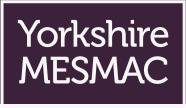Meet our new Peer Support Worker, Afrika!
posted by Erin Marsh
on 18th May 2023
It's Mental Health Awareness Week - and what better time to say hello to our new mental health peer support worker Afrika! They're working as part of the Community Mental Health Transformation Project operating across Leeds, and have some really exciting things in the works... Here's Afrika with an introduction to peer support and the work he's bringing to Leeds.

My name is Afrika, my pronouns are they/he and I’m a Mental Health Peer Support Worker at Yorkshire MESMAC in Leeds. I’m Autistic, nonbinary trans and queer, and a parent. I have worked in a range of fields including healthcare and education, but I’ve always hoped to create a role for myself where I can combine my passion for coordinating activity groups and projects, with my mental health advocacy and lived experience work. When not at work I can usually be found embroidering, mending items of clothing, reading horror fiction or planting something in the garden.
I am passionate about the importance of an intersectional understanding of mental health and how our LGBTIQ+ and/ or BAME identities don’t just affect our mental health but also our experiences of accessing treatment and being assessed and diagnosed with mental health conditions. I am interested in the different ways we can be creative with how we deliver peer support, and how to bring the interests of the group to our work. I believe in in the importance of meeting people where they are at, and looking at recovery as less of a journey with a destination where you are recovered, but a home that you build for yourself with the help of others.
What is peer support?
Peer support workers act as experts by experience, or lived experience practitioners. They come from a range of backgrounds, and work on building equal, mutual relationships with people who have had similar experiences. This work can take place in either group and 1:1 sessions. Peer support is not a form of therapy and is instead closer to mentorship. Group work could look like: recurring support group sessions, a 6 or 12 week course on a specific topic, one-off workshops, or drop in sessions. Peer support workers also work with people 1:1, whether in person or remotely. Often we would set goals together when starting individual work and work for a set number of sessions towards those goals, factoring in interests and hobbies. Peer support isn’t prescriptive and can take whatever form would be most helpful to the individual, whether a walk and talk once a week, or a home visit to work on a recovery plan together.
Who is peer support for?
Peer support is not a clinical or therapeutic intervention, so is sometimes assumed that it is for people who perhaps don’t have a diagnosed mental health condition. Peer support is for anyone who feels they could benefit, and groups are sometimes based around a specific condition, or experience, for example people who experience altered realities and perhaps hear voices, or people who have a history of self harm. It can also bring together people with other shared identities that intersect their mental health experiences, for example parents with mental health conditions, or people who are both Autistic and experiencing difficulties with their mental health. Peer support often exists side by side with other treatment for mental health. Sometimes, groups may even be run around managing medication side effects or sharing experiences around gaining a certain diagnosis.
What does peer support mean to me?
A space to feel heard without being judged, with people who “get it”. An opportunity to learn with others and come up with things together rather than having unsolicited advice pushed at me. That feeling of a weight being lifted when someone says that one thing you’ve been worrying about and were scared to say out loud.
To find out more about our current groups or how to be referred for 1:1 sessions, please email Afrika at a.granger@mesmac.co.uk or call the Leeds office on 0113 244 4209.
To book a place to attend our new LGBTQ+ Mental Health group that is held on Thursday evenings, email Ash at a.dickson@mesmac.co.uk.
